Maine Maritime Academy
A COLLEGE OF ENGINEERING, MANAGEMENT, SCIENCE, AND TRANSPORTATION
Coastal & Marine Environmental Science
|Bachelor's DegreeTackle environmental challenges such as shifting coastal resources, global environmental change, and sea level rise through the coastal and marine environmental science program at Maine Maritime Academy. Through this unique marine environmental science degree, you’ll be well-positioned to become a leader in coastal communities. You’ll benefit from hands-on research opportunities in labs, on research vessels, at nearby field sites, and through service-learning experiences.
At Maine Maritime you’ll experience a low student-to-faculty ratio so you’ll get to know your professors and they’ll get to know you, too. These experts will ensure you have the knowledge and skills you need for marine environmental science jobs, including environmental consultant, aquaculturist, and scientific technician as well as to continue your studies at the graduate level.

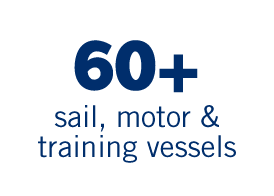
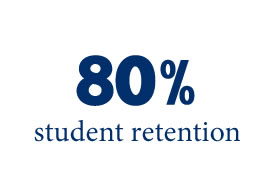
Relevant Location
By pursuing your marine environmental science degree at Maine Maritime, you’ll enjoy easy access to the coast through our ideal location in Castine Harbor on upper Penobscot Bay. You’ll conduct research, collect and identify flora and fauna, learn about coastal geology, and engage in laboratory investigations. You’ll also have quick access to field sites for exploration and research, including Holbrook Island, rocky intertidal shores, local estuaries, salt marshes, and mud flats.
Dual Major Option
If you want to operate small vessels and expand your career options, consider Maine Maritime’s unique coastal and marine environmental science and small vessel operations dual major option. Through this five-year degree path you’ll learn to safely handle and navigate small vessels. You also gain eligibility to test for a U. S. Coast Guard license, up to 200 gross tons, operating in near-coastal waters up to 200 miles offshore.
NECHE-Accredited
The coastal and marine environmental science major at Maine Maritime is accredited by the New England Commission of Higher Education (NECHE), a nonprofit, non-governmental membership organization. With this regionally recognized standard in accreditation you can be sure you’re receiving a quality education.
Student Perspective
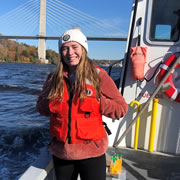
What Is Marine and Coastal Environment?
Coastal and marine environmental science is the study of physics, chemistry, geology, and biology of the coastal and marine environment and their interactions with humans.
Why Study Coastal and Marine Science at Maine Maritime?
When you study coastal and marine environmental science at Maine Maritime Academy, you’ll learn to measure, analyze, and synthesize ocean data and develop solutions to societal issues, such as climate change. Make a positive, impactful change on the ocean environment through this one-of-a-kind marine environmental science degree.
Dedicated laboratories and vessels
Develop strong foundational knowledge in marine science, marine policy, management, statistical methods, and research through state-of-the-art laboratory facilities, including dedicated labs for chemistry, geology, and biology; a running seawater lab; and GIS computer lab. You’ll have access to Maine Maritime’s fleet of vessels, including our 49-foot coastal research vessel, Friendship.
Practical, hands-on learning
Immerse yourself in laboratory courses, including field surveys, collection and identification of local flora and fauna, and coastal geology explorations through this hands-on coastal and marine environmental science degree. Gain real-world experience through summer and field work at places such as the Maine State Aquarium, Boothbay Sea and Science Center, Bigelow Laboratory for Ocean Science, and the Maine Department of Marine Resources. If you choose the dual major option, you’ll be required to complete 120 sea days on appropriate vessels and through laboratories, simulation, cooperative work experiences, and a 14-day training cruise aboard the schooner Bowdoin.
Regiment of Midshipmen
A unique aspect of Maine Maritime Academy is the Regiment of Midshipmen, a uniformed student body devoted to leadership, honor, integrity, discipline, and comradery. While you’re not required to participate when you study coastal and marine environmental science at Maine Maritime, you might choose to join the optional Regiment to build your self-confidence, self-discipline, leadership abilities, and teamwork skills you can use in marine environmental science jobs.
What Can You Do With a Coastal and Marine Environmental Science Degree?
When you graduate with a marine environmental science degree from Maine Maritime Academy, you’ll be well positioned for marine environmental science jobs, such as environmental consultant, aquaculturist, marine technician, scientific support staff, and to work for state and federal agencies, such as the National Oceanic and Atmospheric Administration (NOAA) and the Maine Department of Marine Resources. You might also work in research or education, or gain admittance to graduate or veterinary school.
Career outlook for coastal and marine science
According to the U.S. Bureau of Labor Statistics, employment of environmental scientists and specialists is projected to grow 8% through 2028, faster than the average for all occupations. Heightened public interest in the hazards facing the environment, as well as increasing demands placed on the environment by population growth, are expected to spur demand for environmental scientists and specialists, according to the BLS.
Marine environmental science salary
The median annual wage for environmental scientists and specialists was $71,360 in May 2019, according to the U.S. Bureau of Labor Statistics.
Alumni Perspective
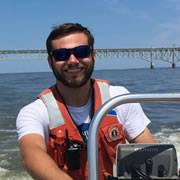
Explore Classes for Coastal and Marine Environmental Science
Through your courses in coastal and marine science, you’ll build a strong knowledge of geological and ecological processes that govern the coastal environment as well as how humans interact with the coastal environment. You’ll take signature courses, such as introduction to sustainability, land margin ecosystems, global environmental change, geographic information science, and coastal resource management. Through your studies, which include courses in the arts and sciences, you’ll learn to communicate scientific knowledge to a broad audience as well as other skills valued in marine environmental science jobs.
- General Biology I
- Chemistry I
- Pre-Calculus
- Introduction to Oceanography & Environmental Science
- First Year Experience
- Seminar 0
- General Biology II
- Chemistry II
- Calculus
- Composition
- Seminar 1
- Swim-related PE Course
- Hum-SS Elective
- Humanities I
- Physical Geology
- Introduction to Sustainability
- Seminar 2
- Tech Physics I
- Chemical Oceanography
- Design and Applied Statistics
- Land Margin Ecosystems
- Seminar 3
- Physical Oceanography
- Ecology
- Global Environmental Change
- Tech Physics III
- Seminar 4
- Any PE Course
- Research Prep
- GIS
- Hum-SS Elective
- Department/Program Elective
- Seminar 5
- Research
- Humanities II
- Department/Program Elective
- Coastal Resource Management
- Seminar 6
- Department/Program Elective
- Hum-SS Elective
- Free Elective
- Free Elective
View all coastal and marine environmental science courses.
Explore Classes for Coastal and Marine Environmental Science and SVO Dual Majors
The Classes for Coastal and Marine Environmental Science/Small Vessel Operations dual major allows the student to complete all of the requirements for the Bachelor of Science degree in Classes for Coastal and Marine Environmental Science and Small Vessel Operations, as well as a USCG license as mate of vessels not more than 200 gross tons, Near Coastal (200 miles offshore). This program may be completed in 5 years and is designed for students who plan to work in the oceanography field and may need the capability to operate small vessels.
- General Biology I
- Chemistry I
- Pre-Calculus
- Introduction to Oceanography & Environmental Science
- First Year Experience
- Seminar 0
- Ocean Survival
- General Biology II
- Chemistry II
- Calculus
- Composition
- Seminar 1
- Hum-SS Elective
- Humanities I
- Physical Geology
- Introduction to Sustainability
- Seminar 2
- Intro to Nautical Science
- Basic Sailing
- USCG Firefighting
- Tech Physics I
- Chemical Oceanography
- Design & Applied Statistics
- Land Margin Ecosystems
- Seminar 3
- USCG Firefighting Live Burn
- Lifeboat Exam
- Physical Oceanography
- Ecology
- Global Environmental Change
- Tech Physics III
- Seminar 4
- Intro to Vessel Operations
- Research
- GIS
- Hum-SS Elective
- Department/Program Elective
- Seminar 5
- Seamanship
- Research
- Humanities II
- Coastal Resource Management
- Seminar 6
- Small Craft Technology
- Small Craft Construction
- Department/Program Elective
- Department/Program Elective
- Hum-SS Elective
- Free Elective
- Free Elective
- SVO Co-op
- Cargo I
- Marine System
- Terrestrial Navigation
- Terrestrial Navigation Lab
- SVO Deptartment Elective
- Meteorology
- Navigation Rules
- Electronic Navigation
- Electronic Navigation Lab
- Topics in Small Vessel Operations
- 200 Ton License Seminar
View all coastal and marine environmental science and small vessel operations courses.
Department Faculty
Get Started on Your Bachelor’s Degree in Coastal and Marine Environmental Science
Take the next step toward earning your marine environmental science degree at Maine Maritime Academy.
Contact an Admissions Representative
If you’re ready to pursue a marine environmental science degree at Maine Maritime, please contact an admissions representative.
Veterans
Maine Maritime Academy welcomes veterans and has the resources in place to help you transition to student life. Please contact our dedicated admissions representative for veterans.
Transfer
Maine Maritime Academy welcomes motivated and academically qualified transfer students. Please contact our admissions office to learn more about transferring to Maine Maritime Academy.
Apply Now and Request More Information
We invite you to start your application or request more information about Maine Maritime’s marine environmental science degree.


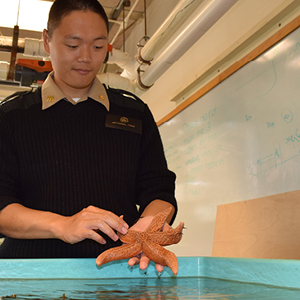
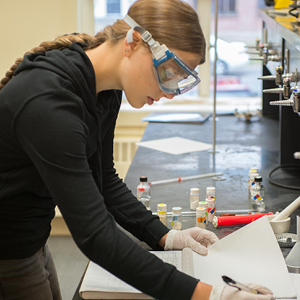







All Rights Reserved © 2026 • Web issue?
Non-Discrimination Notice • Privacy Policy & GDPR